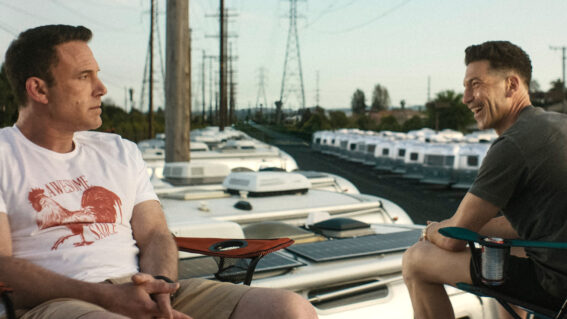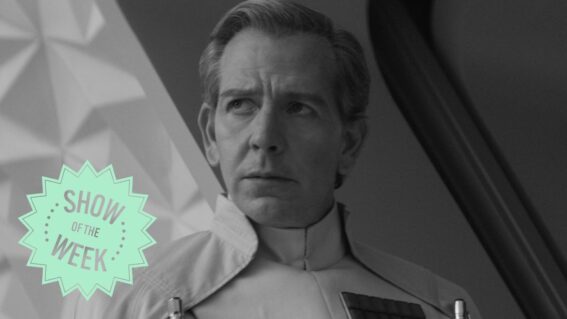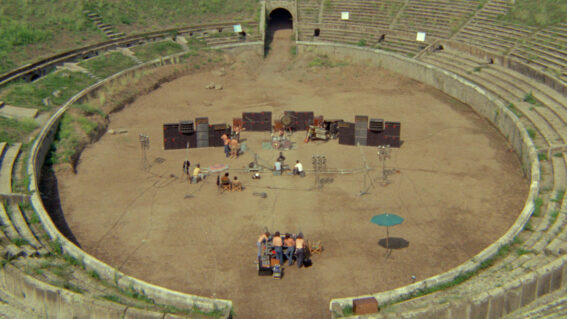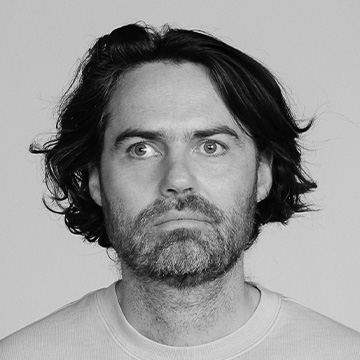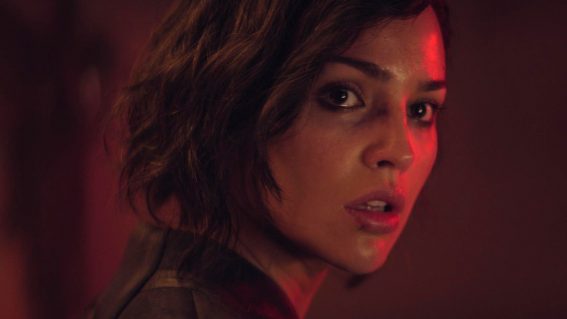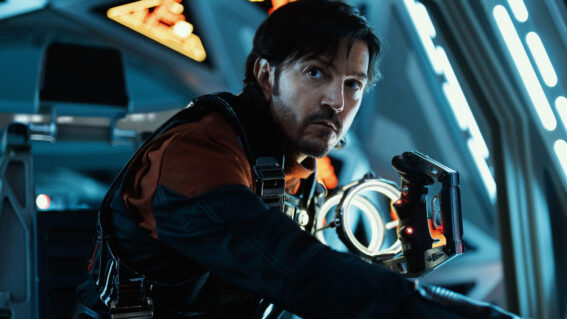Soda_Jerk talk sample-based, political revenge fable Terror Nullius
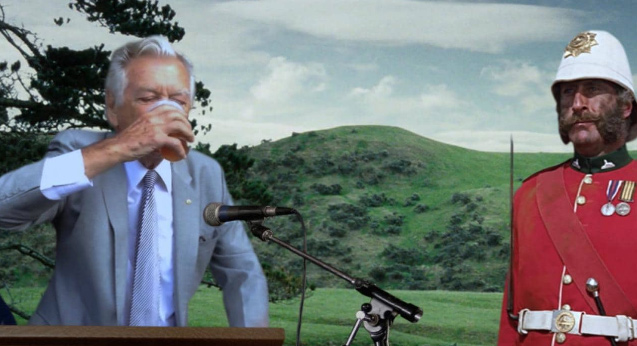
Described in the NZ International Film Festival programme as “an incendiary meeting of unpopular opinion and popular culture: a wildly irreverent up yours to the Australian political status quo”, Terror Nullius is an audaciously entertaining cavalcade and engrossing shit-stir of film and TV samples reworked into a new, urgently agitating whole by two-person art collective Soda_Jerk. Their film travels through the history of Australian cinema and politics, and the duo behind it traveled to Auckland to present Terror Nullius. Steve Newall caught up with them before the first NZIFF screening.
FLICKS: From the title onwards it’s a pretty provocative seeming project. Did you intend it to have such an immediate impact? Just thinking about the title alone as a start.
SODA_JERK: I don’t know to what extent we set out to provoke or anger but we certainly intended for the film to be a provocation of sorts. It emerged from our feelings of despair and rage. Watching politics unfold in Australia, in the last few years in particular, but also we’ve had a sort of pretty dark turn towards conservatism around the world recently. So this project, Terror Nullius, certainly emerged from that.
For New Zealanders who aren’t familiar, could you explain how the Latin phrase terra nullius is used within Australia?
Terror Nullius refers to terra nullius which is a Latin phrase meaning “nobody’s land”. So, this was the term used by colonial settlers when they arrived in Australia and deemed the land ripe for colonisation, despite, of course, the entire nations of peoples who had already owned and occupied that land for more than 60,000 years.
The difference to New Zealand is that there was never any kind of treaty or ceding of sovereignty because the colonisers deemed that there was nobody inhabiting the land. That’s a complete fiction – and so it has actually never been negotiated or any kind of treaty formed. So yeah, in that sense that’s a pretty horrific kind of fiction to be at the very heart of your colonial history and that horror is sort of what we’re trying to tap into. But not only that, also what it means to be nobody’s land for so many other people that are kind of excluded or marginalised by this national mythology of Australia, this kind of toxic masculinity and which preferences a certain kind of people and a certain way of life.
That dominant mythology, that’s a monoculture, right? That’s the version of Australia that’s really been championed internally and externally, would that be fair to say?
It’s one version. We’re interested in multiple mythologies and, in one sense, the national mythology that we take issue with in Terror Nullius is that dominant story of Australia as a land of white, toxic masculinities. But of course I think what’s really important to us with this film is that we’re not necessarily taking Australian films and altogether questioning and sort of flipping the script of these films because I think it’s really important to acknowledge that there are so many Australian films that are already doing interesting work – interrogating and muckraking these dominant mythologies.
And so in some sense, it’s like connecting these films together. Really, it’s a revenge fable on political history. But in terms of Australian cinema, it’s also a love letter to Australian cinema – and also New Zealand cinema, we do sneak in more than a few New Zealand films,.
Thanks for that.
Well, what’s more Australian than willfully taking credit for New Zealand content and talent?
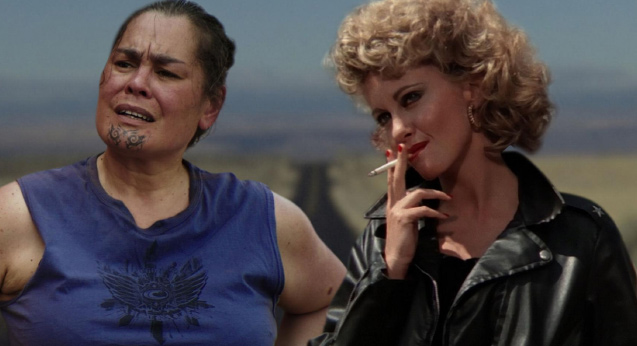
Can you tell me a little bit about the finished product and how complex the process of gathering everything and amalgamating that content was?
The first thing to say is that we are sample-based artists, that we work exclusively in basically making movies from other people’s movies. We make films from existing movies and media and music, so in that sense we sort of see ourselves as renegade archivists, in a sense, more than film-makers. And with Terror Nullius, basically, we’ve taken firstly the canon of Australian cinema but also a lot of art films and artworks and more obscure texts. And we’ve taken samples from these films and re-edited them into a wholly new narrative, an hour-long feature narrative that unfolds across three acts.
We call it a political revenge fable in three acts. But it’s also an eco-horror, a political satire. I mean, you might have the refugees from the Australian film Lucky Miles washed ashore the beach from Puberty Blues but only to be met by the neo-Nazis from Romper Stomper. Or something like the detention centre debates that are in Australia but then folding that into the Mad Max films and so that taking place within the world of Mad Max. So it’s this Australian cinema history which has this level of politics laid over it.
When I think about the masculine mythology of Australian cinema, there’s a lot of mainstream narratives about overcoming challenges and being quite tough and resilient and being able to handle anything – but did people handle the film that you made?
We’ve been stoked and overwhelmed by audiences’ responses to this film and how it’s grown for us in really unexpected ways. The only bad reception we’ve had was by the Ian Potter Foundation who were the actual body, the philanthropic body, that commissioned and funded our film. When they watched the finished product five days out from the premiere they were deeply affronted by its politics.
What did they anticipate?
That’s a really good question. They commissioned the work as a sort of political revenge fable, somewhere between the arthouse and the grindhouse and all the things that it was. And we worked pretty closely with them actually over those 18 months to develop the project. So it’s hard to say. We feel that political art is a really tempting thing for institutions at the moment. It’s appealing in terms of the image politics of right now. It’s really nice to have a political work until it actually arrives and then you’re kind of like, “Oh, this is what a political work is.”
The demographic of the Ian Potter board of trustees which had the final say, as it turns out, they have deeply conservative politics and they’re golfing buddies with some of the prime ministers that we take issue with. And one of the members was the only dissenting judge on the Mabo decision on land rights in ’92. So the sort of politics of that board is deeply out of sync with the project.
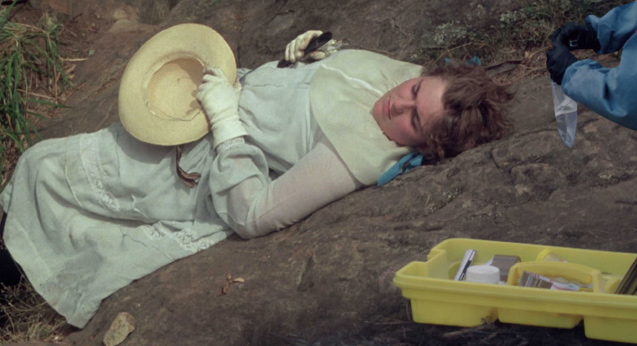
Outside the confines of a film festival or a more art leaning crowd, was there a sense from a mainstream Australian point of view that you were poking fun at figures that shouldn’t be poked fun at? Is it okay within the broader Australian culture to recontextualise these heroes or iconic figures the way you have?
It’s been really important to us to get outside of that crowd, outside of these art audiences and stuff. It has been a real priority of ours to travel it in terms of more cities, town halls, regional communities, remote communities. There hasn’t been a problem really. We’re yet to have some sort of radio jock put into words what perhaps they think about it, but we’ve certainly had really interesting screenings and discussions in more regional and remote parts of Australia which are amazing. We genuinely see this work as a provocation and an invitation to conversation. So those conversations that arise afterwards where people are able to say it may be uncomfortable, this is kind of the point of the work.
Characters like Crocodile Dundee are the kind of heroes that we’re taking down. There are lots of problematic things about that. When you watched it originally the first time you kind of think his cultural uncouthness and casual misogyny is somehow charming – not too many laughs there now. Transphobia, misogyny, you’re just like wow, this does not look the way that I remembered it. There’s a moment in our film where we basically take down Mick Dundee, he’s shot by the female heroine and then devoured by a crocodile and in some ways as audiences are watching this and sort of responding to this we feel like there’s a kind of solidarity in being able to bear witness to these kinds of takedowns.
I think once one of those iconic characters gets onto the world stage you become hyper-aware of how your nationality is being seen on a world scale but there’s some moment of pride. I guess ‘Crocodile Dundee’ probably would have been that, like “Yeah, they’re watching our movie.” And then a dawning sense after a while of “people think we’re all like that…”. ‘Flight of the Conchords’ is a New Zealand example. It’s like a mix of pride and then gradually kind of flips to embarrassment.
Aren’t you guys all Hobbits? Tell us more about some sheep.
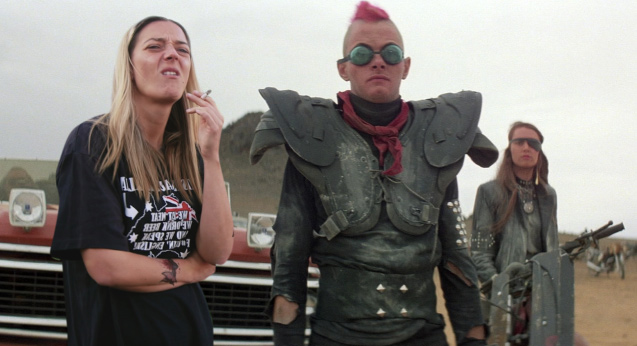
I had a really interesting conversation with Warwick Thornton earlier in the year when he was over here.
He’s such a hero for us.
We talked at length about the concept of being “un-Australian” and I think that probably you’re at risk of having that finger pointed at you as well.
Sure. That was the term that the Ian Potter Foundation actually used when they watched our film and disassociated themselves from it, they said they felt it was un-Australian. For us, wow, if being un-Australian means being willing to ask difficult questions, we’re more than happy to wear that term on our sleeve. It’s crazy that there could be no irony involved in calling a project un-Australian that is actually dealing with what it means to be an Australian. So that’s just the level that you’re at in terms of the lack of sync between where they’re at and where we’re coming from.
I find that amusing, and as you say it proves the concept of the piece that you’ve worked on. But in the context of the growing sense of nationalism internationally it’s also terrifying at the same time. Maybe 10 years ago it would be a complete badge of honour and funny, but it’s a concept that has a little bit of fear associated with it for me at the moment.
Absolutely, that’s what we mean when we say we’re coming from a place of rage. It really literally is that we don’t know how to deal with this current moment. And it really is a time where you have to bring something because it’s terrifying and shocking. And that’s why we felt a horror is the right genre in which to bring to this moment. Because it’s apocalyptic. That’s the way that it seems, this rise of extreme conservatism is extremely worrying internationally and definitely in Australia.
I don’t know whether we have completely rose-coloured glasses looking at New Zealand but my God, we just sort of look in awe and respect with what your prime minister is doing and the way she is putting notions of social justice front and centre in the agenda. And we get teary every time we watch one of her Facebook sort of videos – it seems like you guys are out on a parallel universe.
Yeah, but also look into Taika Waititi’s anti-racism campaigns and what’s just beneath the surface here that’s not so evident. We have our own strains of something going on here. One thing we don’t have is what Ken West from the Big Day Out points out in ‘We Don’t Need a Map’ – you can’t be un-New Zealander-ish. We don’t have a critique like that because you can’t say it!
It’s too many syllables.
It hasn’t emerged yet but I can understand that from an external perspective it looks amazing. Especially when you’re thinking about some of the issues that you are covering in your film.
Maybe it’s more just in optics as well. The only thing that Australia seems to be projecting to the world is extreme racism, unhumanitarian refugee politics. “Stop the boats”. And to be part of that and realise that you’re part of communities of people that don’t feel like that, that have been working on activist projects and amazing people like Warwick Thornton that are producing completely different and radical cultural texts at the same time as your national projection kind of is this extreme conservatism – it feels very dislocating.

Our sister site in Australia did a critics’ poll of the top Australian films of the 21st century.
We saw that, yeah.
Do you think that with 21st Century cinema there’s a different responsiveness to the things that you’ve included within ‘Terror Nullius’? Do you include some of that in your film?
From the 1960’s onwards, it draws from lots of different eras. So these recent films by people like Ivan Sen or Warwick Thornton are part of the canon which we’re using in our film. So in that sense, Australia’s gone through heaps of different periods. There was this kind of period in the ’90’s, there were some land rights wins with the Mabo case, and then Australian cinema went through a series of really amazing, optimistic-looking films and then that now has soured and there is a lot more critical “why has nothing actually happened?” narrative.
We always meticulously document every sample, sonic or visual that we use within a film, but with Terror Nullius we actually order those samples by our prime minister. So we’re interested in visually making those links, folding that cinematic history into the political history of Australia.
Yeah, because no matter how fictional a film is, it’s always connected to the politics of that time.

